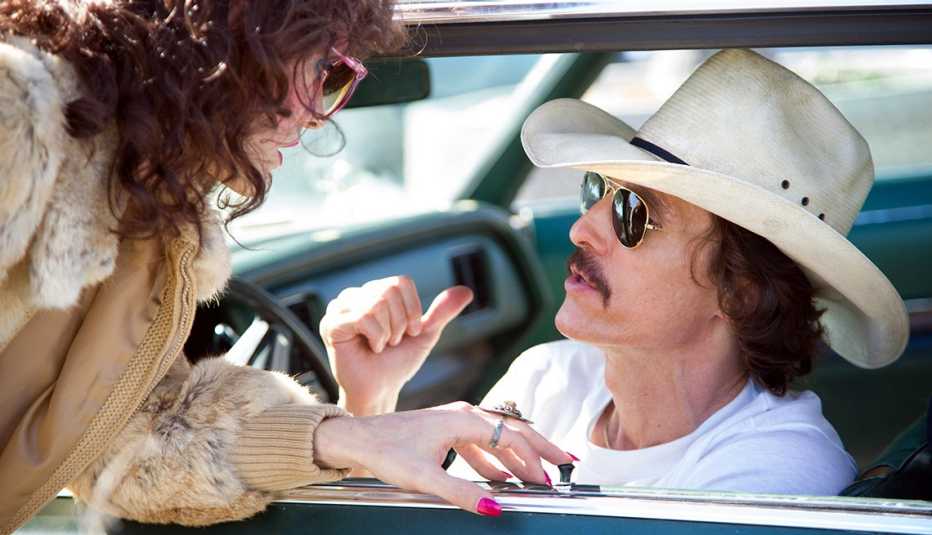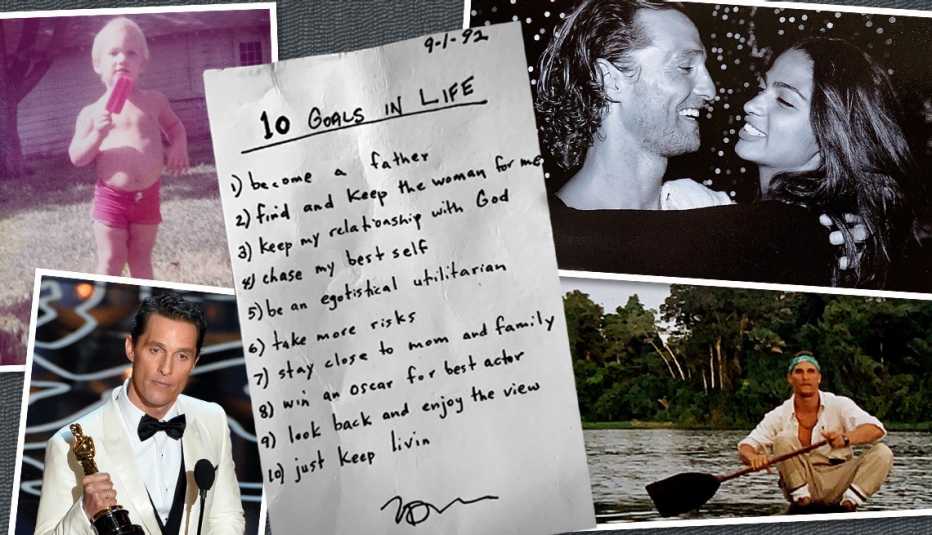AARP Hearing Center
The last time Matthew McConaughey regaled me with his stories, he was nearing the end of his reign as People magazine's 2005 Sexiest Man Alive — restless to move forward, on the verge of reinventing himself.
“I'm pushing onward,” he told me then. As proof, he arrived at our interview not as the pretty boy from one of his rom-com romps but as his We Are Marshall character (a football film he was then promoting) — slightly stooped and swathed in brownish-orange ‘70s polyester. Decidedly unsexy but hearkening back to his blue-collar roots.
McConaughey grew up the youngest of three boys, in a Bible Belt town in East Texas. His schoolteacher mom and steel-pipe-salesman dad (twice divorced, thrice married, to each other) taught him to work hard and kick himself above the surface, once even literally throwing him into a river to sink or swim. He swam, and as an undergrad at the University of Texas at Austin headed for law school, he again thrust himself above the waterline, charming his way into his first film role as the sleazy, scene-stealing slacker in 1993's Dazed and Confused. McConaughey's ad-lib drawl, “Alright, alright, alright,” became an iconic mantra for Gen Xers everywhere and a signature line forevermore associated with him.
While luck played a part, very little of the path he's taken since was random. “Matthew's pretty deliberate,” says Dazed and Confused director Richard Linklater, a longtime friend who directed the actor in two other films. “People were thinking he's some surfer dude. But he's very good at seeing steps A, B, C, D and achieving them. He's not random — he knows what he's doing.”
Several well-received supporting roles followed through the mid-'90s, until McConaughey again summoned his inner audacity to snag a breakthrough lead role as a lawyer in John Grisham's A Time to Kill. The film's success brought him sudden, stratospheric fame. Still, his looks and Southern charm made typecasting inevitable, so that by the time we last spoke, McConaughey had become the king of rom-coms, thanks to films like The Wedding Planner (2001) and How to Lose a Guy in 10 Days (2003).
But then, in search of deeper truths on more serious ground, McConaughey took to the road in his trailer, fell in love off-screen (with Camila Alves, a Brazilian model and designer) and became a father. And so began his next reset, an era he calls his “McConnaissance.”
“I remember saying, ‘Eff the bucks, I'm going for the experience,’ ” he recalls. He quit Hollywood, then emerged as a dramatic force in such films as The Lincoln Lawyer (2011) and the 2014 TV series True Detective. His coronation arrived that same year: a best actor Oscar for Dallas Buyers Club, for which he lost 50 pounds to portray AIDS activist Ron Woodroof.


“He was on fire,” says director Jean-Marc Vallée of McConaughey's intense focus during the 25-day shoot. “He gets the humanity of people who are suffering. He wants to be at the service of something bigger, to help the underdog, to reach out to people and touch them.”
Which is the gist, he tells me, of his latest McConnaissance. Oh, he'll still pop up in those cool, moody ads for Wild Turkey bourbon and Lincoln cars, because he likes the products and because they allow him to do other things, like smaller, lower-budget movies. But perhaps, also, to move far beyond the big and small screens.
He'd already anointed himself the “Minister of Culture” for Austin, Texas, where he and his family are based, when the pandemic hit. In the ensuing months, he posted messages of hope and unity on social media. In March he and his wife raised nearly $8 million via a virtual “We're Texas” fundraiser to help his home state recover from the devastating storm in February.
Then, last year, the actor, 51, put out his memoir, Greenlights — a quirky “playbook,” he says, of the insights and philosophies and green lights that allowed him to move forward on his path. In fact, much of it seems to spring from the philosophy and phrase he embraced after the unexpected death of his father while he was shooting Dazed in 1992: “Just keep livin'.” And now there's talk of “livin’ ” even larger — and another rebranding — as he contemplates a run for governor of Texas. “I'm interested in finding our common denominators,” he says.
Clicking onto our Zoom interview this time, I was pleased to see that McConaughey appeared on-screen as his charming self, rather than a character from his films. There it was, the tan, the dimples, that bourbon-infused drawl. But he's dead serious about trying to help America heal.
“Coming together — that's the radical move right now. That's the dare,” he says, “and we have the ability to do it.”
Here, in a wide-ranging and exclusive interview, McConaughey recounts the radical moves that have brought him to where he is today.
How to Just Keep Livin’


Though I love ‘em, facts only go from the neck up. Storytelling is the best way to communicate. We're raised on stories and folklore. I can tell my children, “You shouldn't do that because of this,” but I have a better chance if I tell a story about the boy who touched fire or tried to put his fork in the electrical socket. If you dramatize the facts, we listen and remember more. And if you weave facts into a personal story, a parable, and make associations, they become like music.









































































